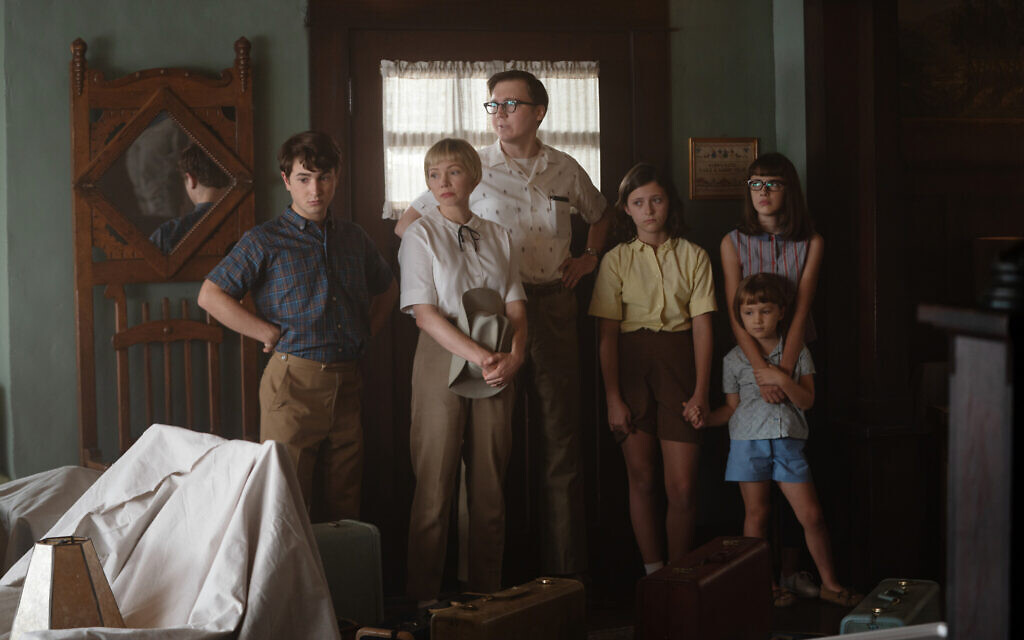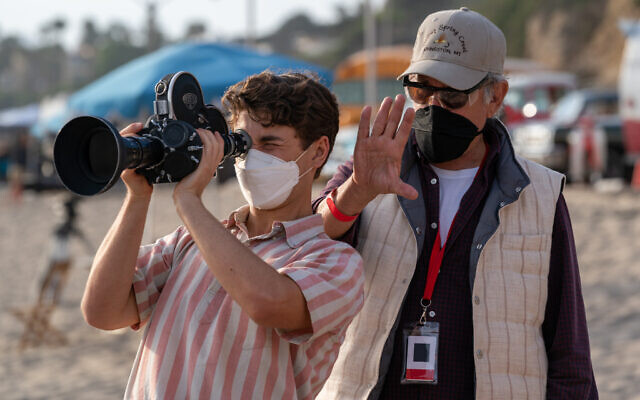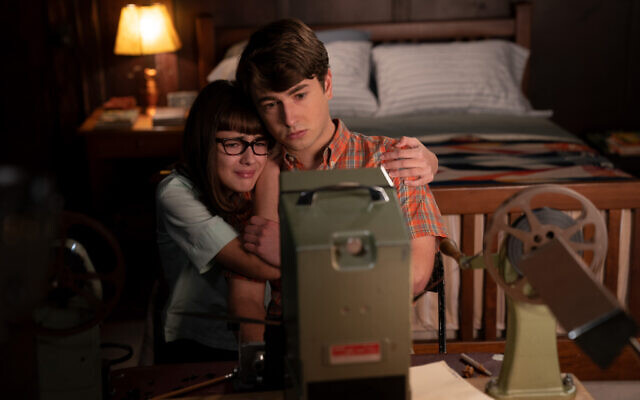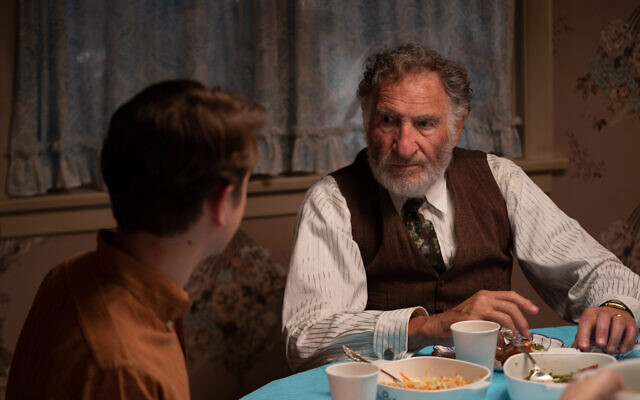Out in NY and LA on Nov. 11 and countrywide the next week, the star-studded autobiography is its acclaimed director’s genesis story, full of references Diaspora Jews will love

NEW YORK — In a recent interview with The Hollywood Reporter, the Pulitzer Prize and Tony Award-winning playwright Tony Kushner explained how the Fabelmans, the central family in Steven Spielberg’s new film, got their name.
“Spielberg means play-mountain,” Kushner said. “‘Spieler’ is an actor in Yiddish, and a ‘spiel’ can be speech or can be a play. I’ve always thought how wild that this guy is this great once-in-a-century storyteller who would be called Spielberg, play-mountain.”
Continuing this thought, he swapped “spiel” with “fabel,” the German word for fable, which perfectly describes how this memoir film from Steven Spielberg isn’t strict autobiography. It’s highly unlikely that a high school-aged genius promised someone that he’d forever keep something secret “unless I make a movie about it someday.” That would just be too perfect.
“The Fabelmans,” in theaters in New York and Los Angeles on November 11, followed by the rest of North America the upcoming week, represents Kushner’s fourth collaboration with Spielberg — but the first time that the legendary director has taken a co-writing credit.
Indeed, throughout his vast career, Spielberg has almost always delegated the business of getting the words on the page to someone else. But this time he isn’t focusing his camera outward to benign space aliens or an adventuresome archeologist, or even toward Normandy Beach or Polish concentration camps, but inward — not only to the peculiar history of his own family, but also to his growth as an artist and a person. It is a remarkable work of cinema, one of the best movies of the year, and unlike anything else in this innovator’s incomparable career.
The two-and-a-half-hour picture zooms by, misdirecting at first to appear like a collection of remembered childhood episodes in the spirit of Federico Fellini’s “Amarcord” or Woody Allen’s “Radio Days.” It emerges out the other end not just an examination of storytelling, or even a celebration of it, but a solemnization. The film’s climax, a pretzel of conflicted emotion, positions young Sammy Fabelman becoming aware of his superpower: knowing how to think cinematically, to express himself in images and editing. But he is still utterly perplexed, even daunted, by this talent. And he is unable to predict how people will react to the magnitude of his work.

Mind you, at this stage in his career he is only making home movies. But there’s a lot going on in his home. The older brother to three sisters, Sam (played at first as a wide-eyed boy by Mateo Zoryon Francis-DeFord, then as a more self-assured and sharp teen by the terrific Gabriel LaBelle), is first to discover that there is discord in his parents’ marriage. His movie camera is a microscope, and by examining the edges of the frame, he puts together that his mother (an astoundingly good Michelle Williams) and his “Uncle” Benny (Seth Rogen) are very much in love. Moreover, his father (Paul Dano) remains unaware.
What everyone else is aware of, however, is that Mom (Mitzi) is one of those larger-than-life people — a center of gravity who commands attention in whatever room (or around any campfire) she is in. It is a special type of woman that can inspire a child, later in life, to create a cinematic love letter even when, let’s get down to it, she did abandon her family to follow her dreams. It is also indicative of the level of maturity and nuance in this elegantly observed story.
Writing teachers often speak of creating something universal by highlighting the specific. For many North American Jews, however, the details in “The Fabelmans” will jump out. Beyond noting theirs is the only “dark” house on Christmas, aside from Mitzi referring to herself as “mamelah” or calling her children “dahlink” in a half-kidding way — or by ignoring her mother-in-law’s “this is brisket?” chides — there’s the unspoken, mostly benign us-against-them defense a Jewish family takes on in a non-Jewish environment. “Let’s leave the family mishegoss at home” the kids decide as they prep for a new day among antisemitic bullies.

There’s also the one proudly Christian girl at school who feels she can save Sam’s soul through necking, which the hormonal teen is not above leaning into. Her bedroom wall is plastered with pictures of the pop music and film stars of the day alongside images of Jesus. (There’s also the young Bob Dylan, but back then very few knew the earnest folkie was actually named Zimmerman.)
There aren’t any bar mitzvah scenes (though certainly some opening of Hannukah gifts), but Judaism saturates this movie. I’d need to consult Lenny Bruce’s legendary Jewish/Goyish routine, but Mitzi setting out dinner on paper plates on a giant paper tablecloth so she can wrap it all up in a ball and have a clean dining room in 15 seconds is just using some sechel (common sense). The official excuse is that she is a pianist, and needs to watch after her fingers.
Mitzi’s gift at music is an only-hinted-at tragedy in the story, one of her roads-not-taken. She gave up playing for family — a family she adores, including her husband, whom she recognizes is unbearably kind. She confesses that when she is at times cruel to him “he buys me a dress.” After a beat, “from Saks,” she adds, reminding us, again, that details are everything.
This may sound like an enormous therapy session for Spielberg, and while that no doubt is part of it, for us in the audience it’s also a tremendous amount of fun. Much of the movie is racing around, making 8mm adventure films (or collecting the Arizona scorpions to trade in for cash to buy the film). There’s also plenty that shows the tactile way in which movies were once made. Kids with their iPhones will be amazed to see the razor blades and glue. There’s plenty of laughs, because that’s part of growing up, even with (or maybe especially with) all the tears.

Judd Hirsch appears in a key scene as Yiddish sage, Great Uncle Boris, to lay out some hard truths about art and sacrifice, and while there’s nothing in his speech you haven’t heard a hundred times before, there is a declarative significance in hearing it told in this setting. Spielberg’s Version of the Gospel of Art. (Hirsch, Jeannie Berlin, Robin Bartlett, and, oddly, David Lynch, are some of the voices who come in during clutch sequences.)
I’ve seen “The Fabelmans” twice now and the thing I can’t get over is just how cleverly it all snaps into place. What’s also impressive is what it doesn’t do. There’s no corny foreshadowing of future Spielberg tropes — nothing about a shark at the beach, or interplanetary lights in the sky, or the crack of a whip. There is, however, an abundant respect for the power of images.
It took Spielberg 50 years to make this movie. He’s instinctively known where to put his camera and how to draw out performances this whole time. It turns out one of the best stories he had to tell was by shooting what was in the mirror.
As reported by The Times of Israel
